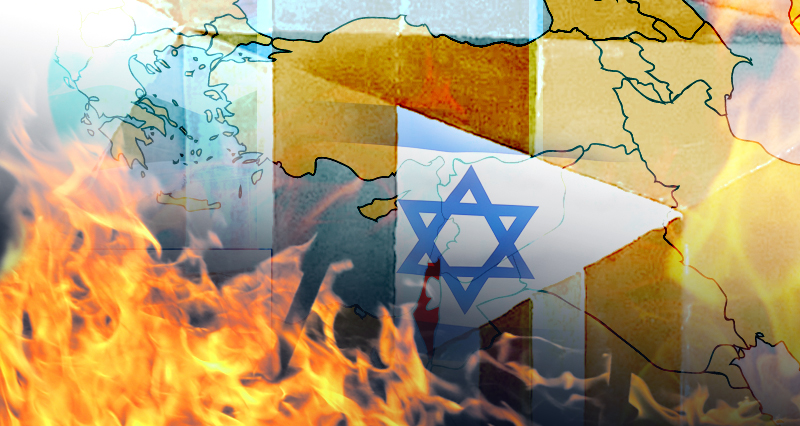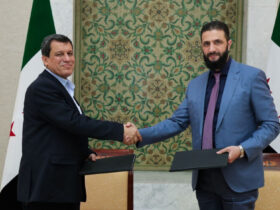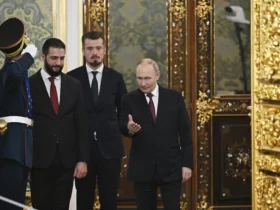The situation in northern Syria has reached a critical point. After a Syrian airstrike killed 33 Turkish soldiers on February 27, Ankara launched large-scale military operations against the Syrian army. As a result, Turkish relations with Russia have reached their lowest point since the crisis in 2015.
At the same time, the situation in Idlib has begun to negatively impact Turkey’s relations with Iran. Hezbollah fighters have already been hit by Turkish aviation and artillery.
Nonetheless, Turkey has not received significant support from NATO. Greece has even vetoed NATO’s statement in support of Ankara, signalling that Turkey’s enemies have succeeded in isolating the country from both the West and the East. The attempted strategy of balance between the NATO Atlantists and the Eurasian Union of Russia and Iran has failed.
Turkish experts are saying that “Turkey is likely to come under mounting pressure to withdraw its military presence in the Euphrates Shield pocket and the Afrin area to the west of the Euphrates and even from areas to the east of the river, which it took hold of in October.”
Thus, as we wrote previously, Kurdish terrorists and separatists stand to directly benefit from the escalation in Idlib. In the future, this will be a problem not only for Turkey, but also for Syria.
Divide and conquer
It should come as no surprise that Israel has been actively involved in the conflict in Syria: Turkish strikes against the Syrian Army coincided with an Israeli air strike on Damascus. On the night of February 28th, an Israeli aircraft struck a Syrian military position in Quneitra. The Israeli military also attacked the villages of Qahtaniya and al-Hurriya from a position in the occupied Golan Heights.
Israel, as the main imperialist power in the region, benefits most from the growing confrontation between Turkey and Russia.
The conflict between Turkey and Syria/Iran is distracting these states from aiding the Palestinian resistance. The Hamas movement, normally supported by Turkey and Qatar, has found itself in a particularly difficult situation: only Israel benefits from the clash of its geopolitical rivals. Meanwhile, the Muslim world as a whole is losing out.
The continuation of the conflict in Idlib will help ease pressure on the PKK in Syria and Iraq. The Kurdish militants are allies of Israel, and their increased strength in the region is directly to Israel’s benefit.
Turkey’s involvement in the bloody war in Syria is also distracting it from the ongoing conflict in the Eastern Mediterranean. In Libya, General Haftar is using the fact that Turkey is distracted in the Idlib in order to push closer to Tripoli. Torn between two conflicts: In Syria and Libya, Turkey will not be able to effectively counteract the struggle for resources in the Eastern Mediterranean.
Given Israel’s unstable domestic political situation, the clash between the Jewish state’s opponents has come as a real blessing.
On March 2, the country held its third consecutive elections with the past year. However, judging by the preliminary results, the balance of power within the Knesset will still not change. Both the Blue and White coalition of Benny Gantza and Benjamin Netanyahu’s Likud Party will receive an approximately equal number of votes and seats. Israel is poised to face a long and tense struggle to form the ruling coalition as a result. In addition, the fate of Benjamin Netanyahu, who has been officially charged with corruption by the Attorney General of Israel, is still in question.
The situation could have opened a window of opportunity for Islamic resistance if the Muslim world had not been pitted against one another as a result of the conflict in Idlib. Instead of fighting each other, Ankara and Damascus could use Israel’s internal problems to counter Zionist foreign policy.
Theoretically, Syria could use the situation to launch a full-fledged strike against the Israeli occupiers in the Golan Heights. In a situation where Syria is in conflict with Israel, the current Turkish leadership will find it difficult to claim that it is engaged in the protection of Muslims. If that is the case, why tdo they not protect Muslims from Israeli imperialism?
In addition, the militants who have accumulated in Idlib could be refocused on fighting Israel rather than Syria. While Muslims are wrapped up in fratricidal conflicts in Syria and Libya, Israel is trying to annex the Jordan Valley with impunity, and, in line with Trump’s “deal of the century”, to gain control of all Jerusalem, leaving the Palestinians only a small piece of the suburbs.
Even if Ankara is not ready to take such a radical step itself, allowing other forces to reorient the conflict toward Israel could grant it the opportunity to continue its effective resistance to the PKK in Syria and to stake out profitable areas in the Mediterranean. However, doing so will require that Turkey take steps to stop the spiral of conflict in Idlib. It is still possible to turn things around, but the question remains: at whose expense? Let Israel, the center of imperialism in the middle-east, pay the price.
















Leave a Reply